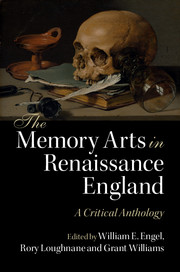Book contents
- Frontmatter
- Dedication
- Contents
- List of figures
- Acknowledgements
- A note on abbreviations
- Introduction
- PART I The art of memory
- Introduction to Part I
- I.1 Stephen Hawes, The Pastime of Pleasure (1509)
- I.2 [Laurence Andrewe], The Mirror of the World (1527)
- I.3 Peter of Ravenna, The Phoenix (1548)
- I.4 Guglielmo Gratarolo, The Castle of Memory (1562)
- I.5 Hugh Plat, The Jewel House of Art and Nature (1594)
- I.6 William Basse, A Help to Memory and Discourse (1620)
- I.7 John Willis, The Art of Memory (1621, 1661)
- I.8 Henry Herdson, Ars memoriae; the Art of Memory Made Plain (1651)
- I.9 Richard Saunders, Art of Memory (1671)
- I.10 Marius D'Assigny, The Art of Memory (1697)
- PART II Rhetoric and poetics
- PART III Education and science
- PART IV History and philosophy
- PART V Religion and devotion
- PART VI Literature
- Index
- References
I.3 - Peter of Ravenna, The Phoenix (1548)
from PART I - The art of memory
Published online by Cambridge University Press: 05 August 2016
- Frontmatter
- Dedication
- Contents
- List of figures
- Acknowledgements
- A note on abbreviations
- Introduction
- PART I The art of memory
- Introduction to Part I
- I.1 Stephen Hawes, The Pastime of Pleasure (1509)
- I.2 [Laurence Andrewe], The Mirror of the World (1527)
- I.3 Peter of Ravenna, The Phoenix (1548)
- I.4 Guglielmo Gratarolo, The Castle of Memory (1562)
- I.5 Hugh Plat, The Jewel House of Art and Nature (1594)
- I.6 William Basse, A Help to Memory and Discourse (1620)
- I.7 John Willis, The Art of Memory (1621, 1661)
- I.8 Henry Herdson, Ars memoriae; the Art of Memory Made Plain (1651)
- I.9 Richard Saunders, Art of Memory (1671)
- I.10 Marius D'Assigny, The Art of Memory (1697)
- PART II Rhetoric and poetics
- PART III Education and science
- PART IV History and philosophy
- PART V Religion and devotion
- PART VI Literature
- Index
- References
Summary
About the author and translator
Peter of Ravenna (c. 1448–1508) was an Italian doctor of law, trained in Padua. He had a distinguished academic career, and in later life worked in Germany at the universities of Greifswald, Wittenberg and Cologne. He was appointed as professor of canon and civil law at the latter institution in 1506. Robert Copland, the translator of The Phoenix, was a London-based printer and author. Several of his works were published at Wynkyn de Worde's print shop. His most famous work is The hye way to the Spyttell hous (1536), a long poem in rhyme.
About the text
First printed in Venice in 1491, Peter's Phoenix, sive artificiosi memoria was one of the most influential continental works about the art of memory, and was printed in several editions (Yates AM notes printings in Bologna, Cologne, Vienna and Vicenza). In one of the first instances of copyright privileges, the Senate of Venice gave Peter the sole rights to print and sell his work. Peter lays claim to his treatise's uniqueness in his explanation of the work's unusual title: Et cum una sit Foenix et unus iste libellus, libello si placet Foenicis nomen imponatur (And since there is (just) one Phoenix and (just) that one book, if the name of Phoenix pleases it may be put for the book). Alongside Jacobus Publicius's Oratoriae artis epitome (1482), which includes an appendix about the art of memory, and Johannes Romberch's Congestorium artificiose memorie (1520), Ravenna's Phoenix was responsible for disseminating the precepts of the ars memorativa among those literate in Latin. As a jurist, Peter was primarily interested in how such mnemonic techniques could aid those in the legal profession, but he also recognised how its practice could be beneficial in many professions. Peter was not bashful about promoting his own prodigious abilities as a mnemonist. Giordano Bruno revealed that he studied the works of Peter on memory as a boy. Cornelius Agrippa, despite his various misgivings about the memory arts, boasted that Peter had been his teacher (Rossi LA, p. 255). Rossi notes the publication of a 1504 work entitled Ars memorativa S. Thomae, Ciceronis, Quintiliani, Petri Ravannee, observing that The Phoenix placed Peter ‘definitively among the classics of the art’ (p. 66).
- Type
- Chapter
- Information
- The Memory Arts in Renaissance EnglandA Critical Anthology, pp. 44 - 51Publisher: Cambridge University PressPrint publication year: 2016



